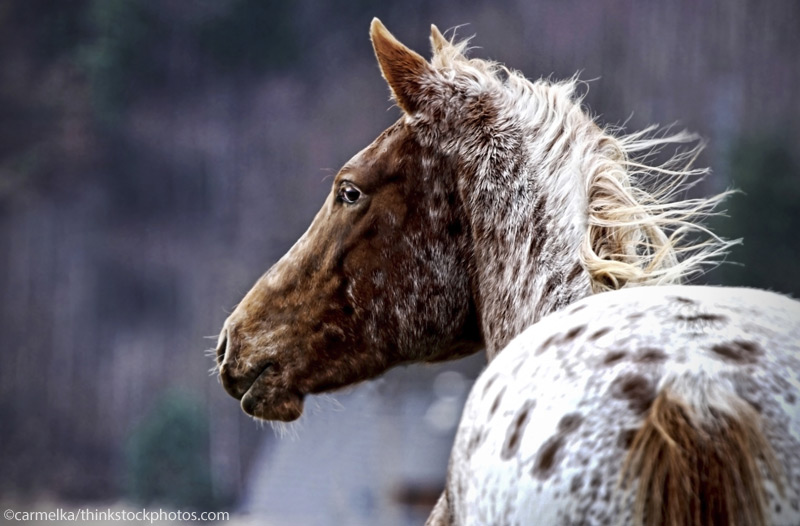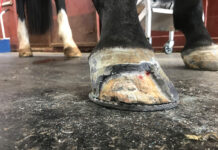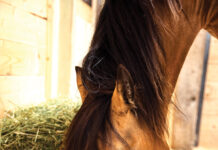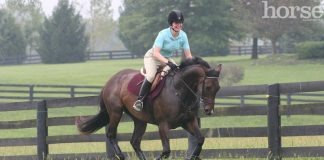Q: A few months ago, I bought an older Appaloosa gelding. He was severely underweight and had heaves. I brought him to my vet and he had his teeth and feet done, was dewormed and received medication for his heaves. The vet said that he was blind in one eye.

A: Blind horses are surprisingly adaptable to their environments, learning to rely heavily on their other senses, especially their ears, to provide clues as to what’s going on. When you are riding or simply near your horse, he then also relies on you. Trust is an extremely important part of any horse/rider relationship, but especially so in your case. You have become your horse’s eyes and when you are on his back, he trusts you to tell him where to go and that it is safe. Looking at the situation from the horse’s point of view, he is a prey animal by nature, relying on mostly sight and sound to tell him where danger is so he can flee at any moment. Losing his sight, he is now at a huge disadvantage out in the wild, so to speak, having to now rely more on his hearing and sense of smell. This can result in a horse becoming more reactive to his environment, that is, spookier. He has less information regarding his environment, therefore has no choice but to react in a more explosive manner to a situation that a horse with sight might decide is not life threatening. Fortunately, many of our domesticated horses are not quite as “on the alert” as their wild counterparts out on the prairies, and from your description, sounds like your older gelding is fairly calm, which works to your advantage. It appears he has lost his sight gradually as well: first in one eye and then in the other, thus making it easier for him to adapt to his handicap.
It can be safe to ride a blind horse, as long as a few precautions are set in place. Firstly, your parents are right to insist on having a third party present when you ride your horse. Always have someone else around, just for the off chance your gelding spooks at something he hears, smells, or thinks he feels. Secondly, take care with the environment where you are riding. An indoor arena with soft, level footing is the ideal location. Obviously remove any obstacles, even if they are located out of the way in the center of the ring. This includes mounting blocks and jump standards. I would not recommend riding out in a field or pasture; this invites too many unforeseen circumstances such as deer suddenly running by, other horses coming up to greet you, a rogue plastic bag fluttering in the wind, etc. Thirdly, always wear a riding helmet. In terms of what to do when under saddle, any flat work is great. Walk, trot, and canter are all fine, and serpentines, flexing, and collecting exercises will help keep your older horse’s body in good shape.
When on the ground, it’s a good habit to always let your horse know where you are. Talking to your horse and keeping a hand on his body are two simple things to let him know not only are you there but also that you are there for him.






Riding a blind horse is safe. A girl in my 4h club has a horse that has no eye in one socket all together. My instrustor has a horse that is blind in his left and is going blind in his right. They both are completely safe to ride and are a very good experience. A good thing for riders riding blind horses is that it teaches them to trust there horse, give clear calm aids, and it also makes them listen to thier horse a lot better.
if you feel safe on him, and he listens to your commands, there is no reason why you cant ride him in my opinion. and possibly in other areas besides an arena too. i rode for 9 years on a horse that couldnt see the broad side of a barn to save his life. i had been riding for 2 yrs when i got him, thunder. a year after getting thunder he got cataracts (at age 5), also he had uveitus, (he was an app/cross) the lenses in his eyes detached and then the pressure was too low in his eyes and they shrank in size. he may have seen a hint of shadows, or he may have gotten to the point of near or complete blindness, im not sure. we rode up many steep mountains, over different terrain, and weaved around mudholes. there was hardly anything that stopped us. plus he rarely spooked. he was probably the calmest horse ive ever been on. we rode at a walk trot and canter, and sometimes a gallop depending on the area/terrain. i rode him by myself too. i hardly ever had anyone to ride with. my mom was worried constantly about me being gone on him all alone, but i always told her my route and how long i would be gone. plus she knew i trusted him and he trusted me. i was constantly aware of where his feet were going and what was around us. he tought me to be an alert rider. it was amazing how intelligent he was. we spent so many hours together, we learned each other up and down. and i think being by ourselves made our time together understanding each other easier, cause he wasnt destracted by other horses. i even put him in some barrel classes at a local show just for fun. yes, we (he) was limited, but we had so much fun together. in the 10 years having him, we had one bad accident, which was the one that caused him to be euthanized. yes, it was because he couldnt see, and he didnt listen to me for some strange reason cause he always did, pulling on the reins and saying whoa to stop him. i feel i let him down, because i was his eyes, but at the same time accidents can happen to any horse with or without site. he may have been “handicapped” but it just made our bond greater, and it didnt keep us in a stall or paddock. people were shocked when they found out he was legally blind!
im not trying to say ignore what was said in the answer to your question, this is purely my opinion and experience only. you and your parents are the only ones to make the final decision on what’s best and safest for you and your horse. good luck!
thunder’s profile is page 167212, if you would like to see him, and if you would like to talk i would be happy to.
ps. if i knew thunder was going to lose his site, and if i would have known we would have a horrible accident, i would have gotten him all over again. he tought me so much, and i may never have a bond with another horse as close as i did with him. being on a horse with site, now, i am yet to feel as safe as i did when i was on thunder. i am thankful he was mine. i miss him dearly, and there will never be another horse like him.
My sisters horse as moon blinded but was a great horse to ride because he trusted us to make sure he wouldn’t hurt himself or us. may he RIP.
Our blind mare, could run with her nose sweeping the ground to “see” if anything was there. Of course her area, has nothing that she could get hurt on.
It depends on the horse itsself. What I mean by that is the fact that I once competed against a horse without eyes (who ironically won that day) and it had so much trust and love for his rider that he did *anything* for that young man. Am I upset that I lost? heck no. I’m proud to say that the blind gelding has changed my opinion for the mythical “rider/horse bond.”
It’s amazing what a great partnership can accomplish.
Great story. My gelding is blind in one eye & has been for at least 8 years, his hearing is very accute and yes he does relie on me to keep him safe, it has taken two years for him to totally trust me. We now can ride safely anywhere & even started doing Endurance Rides this year.
I train reining horses and was given an 8 yo blind gelding who lost his sight 14 months ago. He was an incredible cow horse when he had his sight and the owners were contemplating euthanizing him due to what was thought to be his loss of purpose when they approached me and once I got on him- I gladly took him in and now, after 5 months of connecting, he is in training to be a competition reining horse. (I actually have taken him to a SHOT show and placed on him…) He has blessed me and my training techniques in so many ways, especially in patience, consistency, and accuracy in giving commands. He is the epitome of faith, and trust in me as his seeing eye human. His spirit is willing, and you can feel his enthusiasm when he gets to lope – especially fast circles(most likely because when he’s under saddle, it’s the only time he feels safe to do so) His hearing and smell is incredibly sensitive and accurate and I do exactly as the articles mention; save the muzzle hair, and I also keep his ears trimmed closer, plus, his eyes weep a bit so he has a fly mask on all summer when he’s outside in the pasture. It has humbled me in knowing and accepting that I have been blessed with an animal that takes special attention, living arrangements, and more so, that I was chosen to be his keeper. Thank you God for the blessing of watching over and working with your special one…
drperfhorses.com